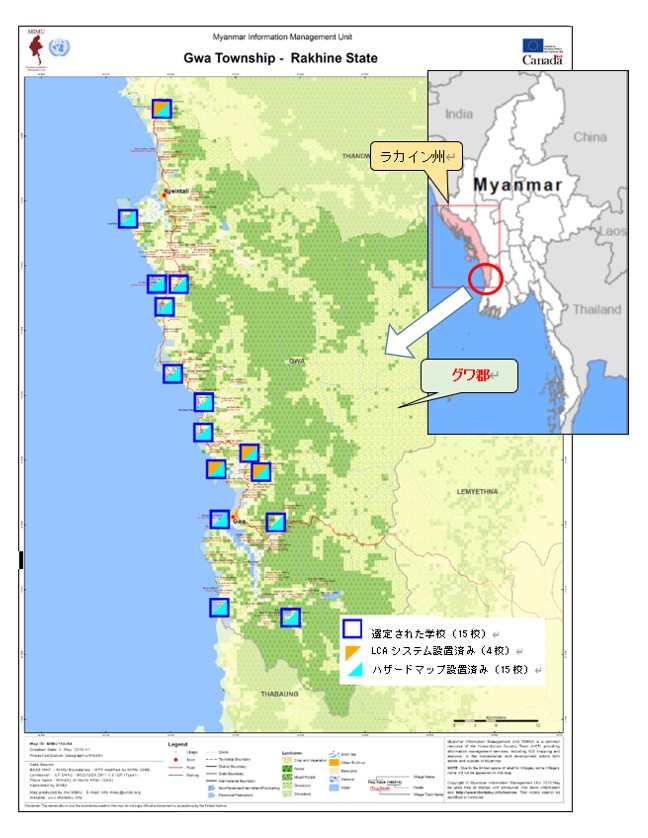Disaster risk reduction support and health and hygiene awareness improvement projects in schools and villages in Gwa Township, Rakhine State
2021.7.2 Fri 13:42


FY 2020 project completion report
After being selected for Grant Assistant for Japanese NGO Project (Note), “Disaster risk reduction support and health and hygiene awareness improvement Projects in school and villages in Gwa township, Rakhine State” commenced in January, 2020 and completed in December, 2020.
The aim of this project is to provide a Learning and Communication Assist system for students and residents (LCA system) and hazard maps at schools and villages in Gwa township, which is located in the southernmost part of Rakhine State and is often affected by cyclones. They have been set up and used to improve the disaster prevention ability of students and residents and raise their awareness of health and hygiene. Project period is two years and profiles of project activities for the 1st year are as follows;
(1) Introduction of LCA system (1st year: 15 schools),
(2) Creating and installing hazard maps (1st year: 15 schools),
(3) Disaster prevention training session for teachers
(4) Improvement of awareness of health and hygiene
This is our first project in Rakhine State. Therefore, on January 17, President Akabane and Director Dobashi of BHN paid a courtesy call on the chief minister of Rakhine state (Photo-1).
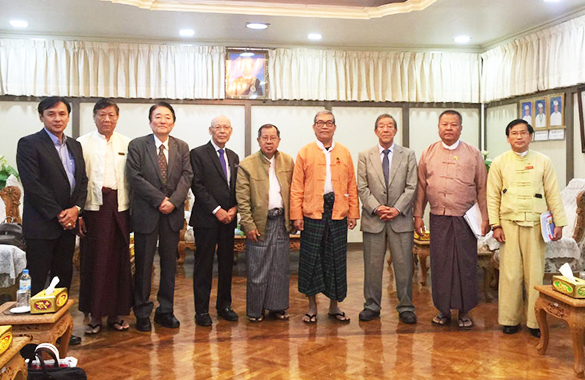
Photo-1:Group photo with chief Minister at Rakhine State Government Building
On January 20, an advocacy meeting was held in Gwa (Photo-2), inviting the Minister of Social Welfare of Rakhine State, the Undersecretary of the Ministry of Health, and community officials.
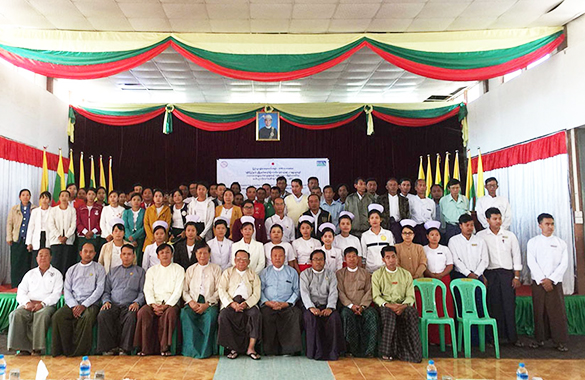
Photo-2:Kick-off meeting at Gwa project site
Following the meeting, site surveys for LCA systems and hazard maps, and health and hygiene baseline surveys (Photo-3 & 4) were conducted from February to March.
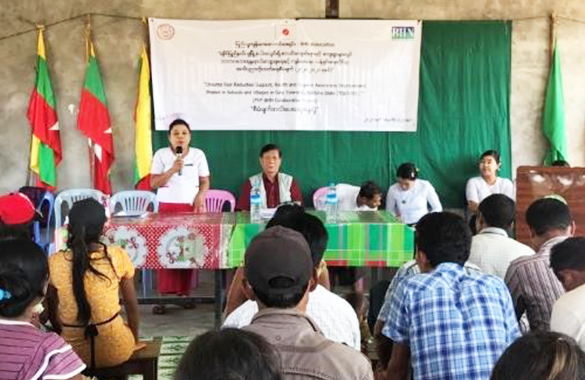
Photo-3:Held a briefing session for the health and hygiene baseline survey
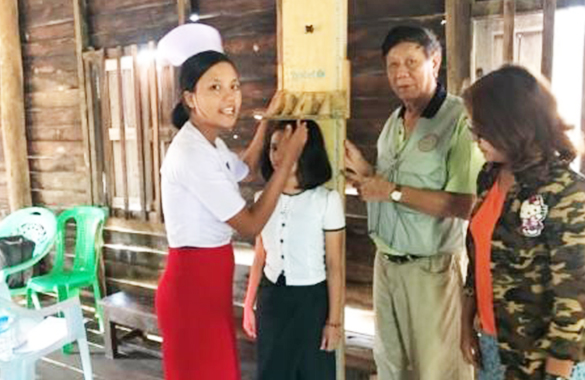
Photo-4:Physical measurements in a health and hygiene baseline survey
After that, in order to prevent the spread of COVID-19, which became a worldwide problem, the Union of Myanmar government strengthened immigration restrictions for all foreigners, and quarantine measures that occurred when moving to Rakhine State, school closures, etc. Although project activities were restricted due to restrictions on going out, we worked closely with local representative online taking the local situation into consideration.
In addition, we left appropriate instructions to the local representatives, installed the LCA system and hazard map as shown below, and energetically prepared training materials. Under such circumstances, there was an unexpected and happy result that the local staff acted more proactively than ever before.
Looking back on the progress of the work throughout the year; in the first quarter, we conducted preparatory work such as site survey for the installation of the LCA system, Hazard map, and a baseline survey to raise health and hygiene awareness. In the second quarter, we energetically performed under movement restrictions due to the occurrence of the first wave of Covid-19, design work by working from home, ordering work, etc., After those works we prepared for the installation of the LCA system, and summarized the results of the baseline survey. In the third quarter, during the installation of hazard maps and LCA system, the second wave of Covid-19 occurred, and schools were closed again, and lockdown occurred in Rakhine State. The quarantine was activated and strengthened. The quarantine obligation for 3 weeks at the site and the quarantine after returning to Yangon, make it impossible to continue the activities, and work was unavoidably suspended. In the fourth quarter, a general election was held in November while the Covid-19 did not converge, and activities were severely restricted.
Regarding the installation of the LCA system (Photo 5-7), at 11 of the 15 schools originally planned the systems could not be installed due to the movement restrictions by the Myanmar government to prevent COVID-19. Hazard maps could install at 15 schools as planned.
At these schools and villages, we were able to improve the disaster prevention capabilities of the residents, such as being able to convey disaster prevention information when a cyclone invades.
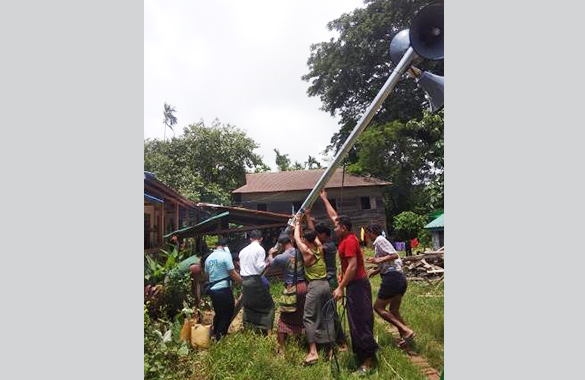
Photo-5:LCA system installation site
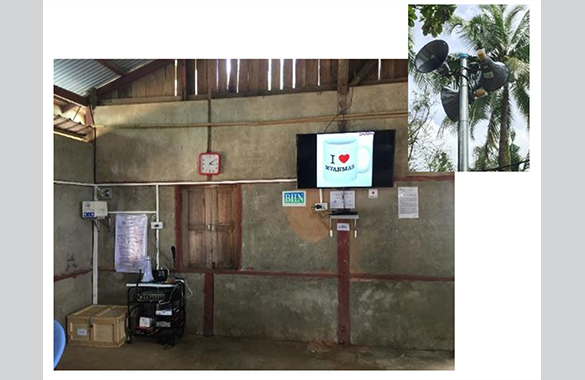
Photo-6:Overview of the completed LCA system
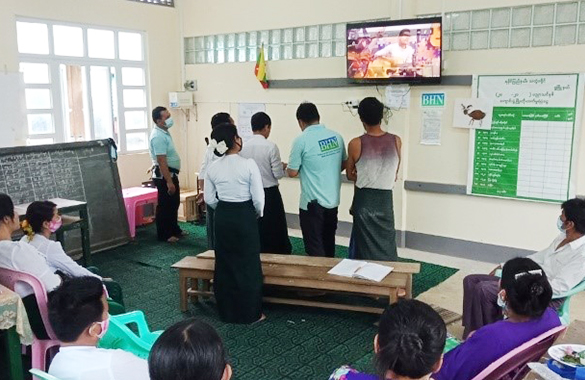
Photo-7:LCA system usage explanation
The location of the school where hazard map was installed shown in Attached Figure 1.
Fig. 1 Installed LCA system Location of school
The installation of the hazard map and photos of the students who participated in the hazard map briefing are shown in Photo-8-9.
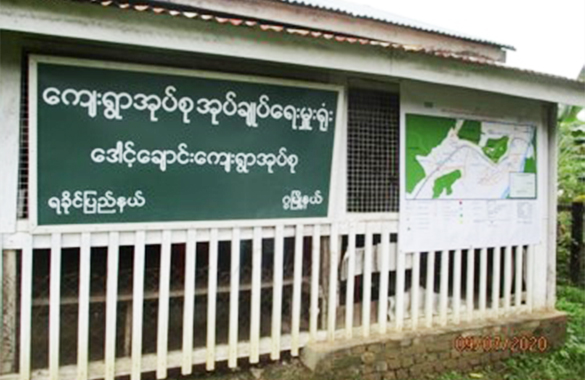
Photo-8:Hazard map installation at school in Daung Chaung village
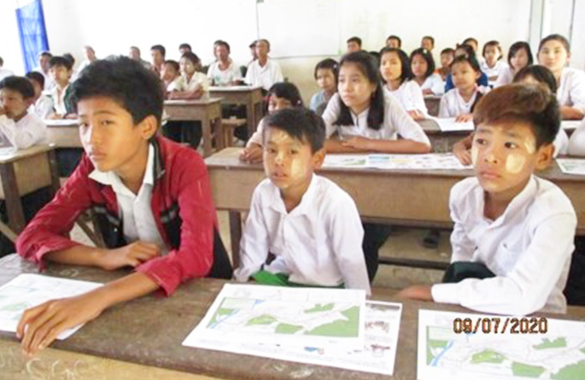
Photo-9:Students who participated in the hazard map briefing session
To raise health and hygiene awareness, we conducted a baseline survey of health and hygiene status and prepared a health status report to understand the health and hygiene status of students and residents in the area where the LCA system was installed.
As a result of the survey, the percentage of students with a BMI (body mass index: index indicating the degree of obesity calculated from weight and height) of 18.5 (underweight or less) of students in Gwa township was 78.8%, which is four times higher than the Myanmar average of 18%. It was found that nutrition education for students and parents is necessary.
Result of baseline survey were summarized in a health status report. Based on Village Health Profile and health status report, message for improvement of health and hygiene awareness were compiled into book. In the 2020 project, we could not carry out all the activities originally planned due to the influence of Covid-19, but the activities that could not be done in the first year (installation of LCA system at 11 schools and etc.) are going to implement in the early stage of the second year (2021).
Note: Grant Assistant for Japanese NGO project is a fund which the Ministry of Foreign Affairs of Japan provides for economic and social development projects conducted in developing countries and regions by Japanese international NGO.
Project coordinator Eiichi Watanabe

